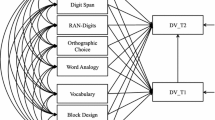Abstract
In a longitudinal study, we looked at the link between children'sunderstanding of a morphemically-based orthographic rule and theirawareness of morphemic distinctions. The orthographic rule in question wasthe use of the apostrophe to denote possession in English. Early on in thestudy, we gave the children phonological, semantic/syntactic and morpho-syntactic awareness tasks, and later we gave them a spelling task in whichthey had to write words which were either genitives (e.g., `boy's') ornominative or accusative plurals (e.g., `boys'). Eight- to 10-year-oldchildren found this task difficult, but their performance improved to someextent with age. The morpho-syntactic, but not the phonological orsemantic/syntactic, awareness tasks predicted how well the children placedapostrophes in genitive words and omitted them from plural words. Weconclude that different forms of linguistic awareness affect differentaspects of reading and spelling. Learning about spelling patterns based onmorphemes is heavily influenced by children's morpho-syntactic awarenessbut not, apparently, by other forms of linguistic awareness.
Similar content being viewed by others
References
Adams, M.J. (1990). Beginning to read. Cambridge, MA: MIT Press.
Bowey, J.A. & Patel, R.K. (1988). Metalinguistic ability and early reading achievement, Applied Psycholinguistics 9: 367–383.
Bradley, L. & Bryant, P.E. (1983). Categorising sounds and learning to read - a causal connection, Nature 301: 419–521.
Bryant, P., Devine, M., Ledward, A. & Nunes, T. (1997). Spelling with apostrophes and understanding possession, British Journal of Educational Psychology 67: 93–112.
Bryant, P.E., MacLean, M., Bradley, L.L. & Crossland, J. (1990). Rhyme, alliteration, phoneme detection and learning to read, Developmental Psychology 26: 429–438.
Bryant, P., Nunes, T. & Bindman, M. (1997). Backward readers' awareness of language: strengths and weaknesses, European Journal of Psychology of Education 12: 357–372.
Bryant, P., Nunes, T. & Bindman, M. (1999). Awareness of language in children who have reading difficulties: a longitudinal, historical study, Journal of Child Psychology & Psychiatry (in press).
Carlisle, J.F. (1995). Morphological awareness and early reading achievement. In: L.B. Feldman (ed.), Morphological aspects of language processing (pp. 157–188). Hillsdale, NJ: Erlbaum.
Fowler, A.C. & Liberman, I.E. (1995). The role of phonology and orthography in morphological awareness. In: L.B. Feldman (ed.), Morphological aspects of language processing (pp. 157–188). Hillsdale, NJ: Erlbaum.
Gombert, J.E. (1992). Metalinguistic development. Hemel Hempstead: Harverster Wheat-sheaf.
Goswami, U. & Bryant, P. (1990). Phonological skills and learning to read. London: Erlbaum.
Kirtley, C., Bryant, P., MacLean, M. & Bradley, L. (1989). Rhyme, rime and the onset of reading, Journal of Experimental Child Psychology 48: 224–245.
Lundberg, I. (1994). Reading difficulties can be predicted and prevented: a Scandinavian perspective on phonological awareness and reading. In: C. Hulme & M. Snowling (eds.), Reading development and dyslexia (pp. 180–199). London: Whurr Publishers.
Mann, V.A. (1986). Phonological awareness: the role of reading experience, Cognition 24: 65–92.
Mann, V., Tobin, P. & Wilson, R. (1987). Measuring phonological awareness through the invented spelling of kindergarten children, Merrill-Palmer Quarterly 33: 365–391.
Morais, J., Alegria, J. & Content, A. (1987). The relationship between segmental analysis and alphabetic literacy, Cahiers de Psychologie Cognitive 7: 415–438.
Morais, J., Bertelson, P., Cary, L. & Alegria, J. (1986). Literacy training and speech segmentation, Cognition 24: 45–64.
Morais, J., Cary, L., Alegria, J. & Bertelson, P. (1979). Does awareness of speech as a sequence of phones arise spontaneously?, Cognition 7: 323–331.
Nunes, T., Bryant, P. & Bindman, M. (1997a). Morphological spelling strategies: developmental stages and processes, Developmental Psychology 33: 637–649.
Nunes, T., Bryant, P. & Bindman, M. (1997b). Learning to spell regular and irregular verbs, Reading and Writing: An Interdisciplinary Journal 9: 427–449.
Read, C., Zhang, Y., Nie, H. & Ding, B. (1986). The ability to manipulate speech sounds depends on knowing alphabetic spelling, Cognition 24: 31–44.
Rego, L.L.B. & Bryant, P.E. (1993). The connection between phonological, syntactic and semantic skills and children's reading and spelling, European Journal of Psychology of Education 8: 235–246.
Tunmer, W.E., Herriman, M.L. & Nesdale, A.R. (1988). Metalinguistic abilities and beginning reading, Reading Research Quarterly 23: 134–158.
Tumner, W.E., Nesdale, A.R. & Wright, A.D. (1987). Syntactic awareness and reading acquisition, British Journal of Developmental Psychology 5: 25–34.
Stanovich, K.E., Cunningham, A.C. & Cramer, B.R. (1984). Assessing phonological aware-ness in kindergarten children: issues of task comparability, Journal of Experimental Child Psychology 38: 175–190.
Schonell, F. & Goodacre, E. (1971). The Psychology of Teaching Reading. London: Oliver and Boyd.
Wagner, R.K. & Torgeson, J. (1987). The nature of phonological processing and its causal role in the acquisition of reading skills, Psychological Bulletin 101: 192–212.
Author information
Authors and Affiliations
Rights and permissions
About this article
Cite this article
Bryant, P., Nunes, T. & Bindman, M. The relations between children's linguistic awareness and spelling: The case of the apostrophe. Reading and Writing 12, 253–276 (2000). https://doi.org/10.1023/A:1008152501105
Issue Date:
DOI: https://doi.org/10.1023/A:1008152501105



